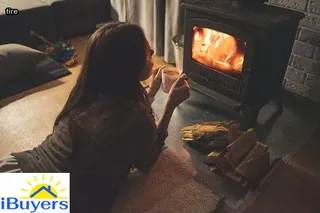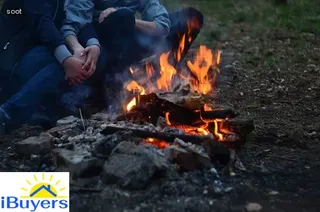The devastating reality of fire is one that cannot be ignored. Fire can cause irreparable damage in a matter of minutes, leaving homeowners scared and helpless.
Though it may seem like an unstoppable force, there are certain steps homeowners can take if they find themselves facing a house fire. Knowing what to do in the event of a fire can help reduce the damage and keep you safe.
The first step is to call 911 right away so that firefighters can come quickly and begin to control the blaze. Then, it's important to leave the property as soon as possible, making sure all family members have evacuated safely.
Thirdly, try to close any doors or windows to limit oxygen flow and slow down the spread of flames. Fourth, if you have time, grab some essential items like your wallet or passport before rushing out of the house.
Lastly, remember not to re-enter until told it is safe by firefighters or other emergency personnel on site. With these five steps in mind, homeowners can better prepare themselves for an unexpected house fire and respond quickly and efficiently when tragedy strikes.

When a kitchen fire breaks out, it can cause extensive damage and be incredibly costly to repair. Homeowners must take quick action to minimize the destruction done by the fire.
As well as ensuring the safety of all residents in the house, there are certain steps that should be taken in order to count the cost of a kitchen fire. First, call emergency services immediately to contain and extinguish the flames.
Then assess any damages caused by smoke or soot. Next, contact your insurance company to learn about their coverage for fire damage repairs.
After that, get an estimate for these repairs and consider whether it is more beneficial to restore or replace items affected by the fire. Lastly, keep all receipts from any purchases you make related to these repairs or replacements as they can be used for tax deductions in some cases.
The best way to protect your home and family from a devastating house fire is to take preventive measures. It's important to be proactive in order to reduce the risk of your home and belongings being destroyed.
Taking steps like installing smoke alarms, storing flammable materials away from heat sources, creating an evacuation plan, conducting regular maintenance and inspections, and having a fire extinguisher on hand are all essential for crafting an effective plan for prevention. Smoke alarms should be tested monthly and batteries should be replaced at least once a year to ensure they are functioning correctly.
Storing flammable items such as gasoline, paint thinner, and matches away from any heat sources will help reduce the chances of a fire starting due to accidental contact with these items. Creating an evacuation plan can also help reduce panic and confusion if a fire were to occur.
Designate specific exits for each room of the house, practice escape routes multiple times with family members, and make sure everyone knows where the designated meeting spot outside is located. Regular maintenance can go a long way in preventing fires by identifying potential problems that could lead to combustion or spark electrical fires.
Lastly, it's always good practice to have a working fire extinguisher on hand in case of an emergency.

When a house is on fire, it can be one of the most terrifying experiences. Homeowners need to know how quickly emergency responders will arrive at the scene. Knowing what steps to take in an emergency situation can help reduce the amount of damage done to the home and even save lives.
It's important to keep in mind that every second counts when a house is on fire, so acting as quickly as possible is essential. First, call 911 or your local emergency services number immediately upon discovering the fire. When placing the call, provide detailed information about your exact location and any further details about the incident you can offer.
Second, don't enter a burning building until it has been cleared by firefighters or other emergency personnel - even if family members are still inside. Third, stay near the entrance of your home once you have evacuated so that you can direct first responders towards it. Fourth, make sure everyone involved is safe and evaluate any potential medical needs while waiting for help to arrive.
Finally, be prepared with a list of emergency contacts who should be notified as soon as possible after the incident occurs. By following these steps during an emergency situation involving a house fire, homeowners will greatly increase their chances of having a quick response from first responders.
When a house fire occurs, it can be devastating. Beyond the destruction of physical belongings, the emotional pain and mental trauma of losing everything that was in your home can be overwhelming.
It is important to acknowledge these feelings and take steps toward healing. In the wake of a house fire, start to grieve your losses by allowing yourself to feel what you need to feel, expressing those emotions with people who understand, and seeking help from a mental health professional if necessary.
Additionally, reach out for support from family and friends and find solace in activities that bring joy or peace. Finally, create routines that bring structure and consistency back into your life as you adjust to this new normal.
While it may seem difficult at first, understanding and dealing with our emotions after a house fire can help us move forward in a healthy way while also honoring our memories and helping us heal.

In a crisis like a house fire, it can be difficult to know what to do. However, in times of distress, we can take comfort in knowing that our experiences provide us with a sense of hope.
By learning from these experiences, we can make the best decisions for ourselves and our family when faced with danger. Taking the proper steps during an emergency is essential for safety and peace of mind.
Here are five steps to consider when your house is on fire: remain calm and focus on safety; identify the source of the fire; call 911 or your local Fire Department immediately; get out of the building quickly but safely; and never go back into a burning structure. Although dealing with a home fire can be frightening, understanding how to handle this kind of situation by learning from experience provides us with a sense of hope that everything will be alright in the end.
When your house is on fire, it can be difficult to know how to cope with the aftermath. Dealing with the losses and trauma experienced from a house fire requires both emotional and physical steps in order to heal and move forward. It is important to address the stress, anxiety, and sadness caused by the event as quickly as possible in order to begin the recovery process.
Here are five tips and strategies for coping with the aftermath of a house fire:The first step is to seek professional help if needed. Trauma resulting from a house fire can be overwhelming, so seeking counseling or therapy may be beneficial in helping you manage reactions such as guilt, fear, anger, or depression. Additionally, talking through your emotions with friends and family members can also help you heal.
The second step is to document the damage caused by the fire. Collecting evidence such as photos or videos of any structural damage can help you process what has been lost and gain closure. This step will also assist with filing insurance claims for damages that were incurred due to the fire.
Thirdly, take time off from work or school if needed in order to focus on your wellbeing. Taking a break from regular activities will allow you space and time for healing without feeling overwhelmed by deadlines or obligations that were established before the incident occurred. Fourthly, practice self-care during this trying time.
Take care of yourself physically by eating nutritious meals and getting plenty of rest; try activities that make you feel safe such as yoga or meditation; establish healthy boundaries when communicating with others about your experience; and find ways to express yourself creatively like writing poetry or journaling your feelings. Finally, reach out for resources whenever needed during this difficult time period; local churches may provide aid in various forms such as financial assistance or material goods while community organizations offer mental health services at little-to-no cost. These resources may enable you to get back on track faster than would otherwise be possible after experiencing a house fire.

When it comes to protecting your home and family from disaster, having the right insurance coverage is key. Before you sign up for a policy, it's important to compare quotes from different insurers to ensure you're getting the best value.
Look for coverage that specifically covers fire damage, as well as any other potential disasters that may occur in your area. Create an emergency plan with your family and make sure everyone knows how to get out of the house safely if a fire breaks out.
Additionally, be aware of common fire hazards around the home and take steps to reduce the risk of fires occurring in the first place. Install smoke alarms on each level of your house and test them regularly.
Make sure all electrical outlets are properly grounded and never overload circuits with too many appliances or electronics. Finally, practice an escape route with your family at least once a year so everyone knows what to do in an emergency situation.
When the smoke clears after a house fire, it can be an overwhelming experience to confront the aftermath. However, there are steps that can help you move forward.
First, contact your insurance company and create an inventory of all lost items. Make sure to save any documents such as photographs or important papers that may have been damaged in the fire.
Second, reach out to family and friends for emotional support during this difficult time. Third, take time to grieve the losses incurred due to the fire and create a plan for rebuilding your home.
Fourth, find temporary housing while repairs are being made and explore different housing options if necessary. Fifth and finally, research financial assistance programs that may help with roofing costs or other expenses resulting from the fire damage.
Although navigating the aftermath of a house fire can be challenging, these steps will help you move forward towards recovery.

When it comes to house fires, timely action can be the difference between life and death. Before a fire breaks out, there are warning signs that can alert people to potential hazards in the home.
It's important to pay attention to these signs and take steps immediately if you suspect a problem. First, inspect your home for any exposed wires or faulty wiring that could lead to sparks.
Check all smoke detectors and replace batteries if necessary. Second, ensure that all flammable materials such as curtains, bedding, clothing, rugs and carpets are kept away from sources of heat such as radiators or open flames.
Third, avoid overloading power outlets with too many appliances as this increases the risk of fire due to overheating. Fourth, inspect your chimney regularly for blockages or deposits of soot which could cause a fire to spread quickly throughout the house.
Finally, check your home regularly for signs of pests like rodents or birds which may be nesting near electrical wires and causing sparks. By following these steps, you can help prevent a potentially devastating house fire from occurring in your home.
Stories of survival and resilience amidst tragedy are inspiring reminders that, even in the midst of a disaster, people can still find strength to persevere. When confronted with a house fire, it can be difficult to know how to respond; however, there are some basic steps one should take.
First and foremost, it is important to stay calm and evacuate the premises as quickly as possible. Next, call 911 or your local fire department for help.
It is also wise to shut off gas lines (if applicable) and move flammable items away from the flames; however, always remember to prioritize safety above all else. Once out of harm's way, contact your insurance company and document any personal belongings that have been lost or damaged due to the fire.
Lastly, seek support from family and friends who can provide emotional comfort during this traumatic time. By taking these five steps when your house is on fire, you will be better prepared for potential peril in the future.

When a fire has destroyed your home, it is not only heartbreaking but can also be overwhelming. It is important to remember that you are not alone in this experience and that there is a community of people who understand what you are going through and want to help.
Reaching out to others can make all the difference in making it through this difficult time. One way to do this is by seeking professional counseling with a licensed therapist or social worker.
Talking with someone with experience in dealing with the emotional aftermath of a fire can help you process your grief and trauma and find comfort in knowing that you are not alone. Additionally, joining support groups or workshops focused on helping those affected by fires can give you the opportunity to connect with other survivors who have gone through similar experiences and provide understanding, advice, and comfort.
Finally, taking time for yourself to relax, read books or do activities that bring peace can be an invaluable way to cope with your emotions after a fire. No matter how hard it may seem now, there is hope for recovery from this tragedy and finding comfort in community togetherness can make all the difference.
When tragedy strikes, it can be difficult to know what to do or how to help. One of the most heartbreaking situations is when a house catches fire and the family is displaced.
In these difficult times, it is important for family and friends to come together and provide whatever support they can. Here are five steps that can be taken to ensure everyone affected by a housefire receives the emotional and practical support they need: Show up - The best way to start helping is simply being present.
A hug or kind words from a loved one can go a long way in comforting someone who has just been through an extremely traumatic experience. Listen - Everyone copes with trauma in different ways, so it's important to give people space to express their feelings without judgment or interruption.
Offer Practical Support - It may not seem like much, but offering basic supplies such as food, clothing, blankets, and toiletries can help immensely during this time of crisis. Connect Them To Resources - Knowing where to turn for help during a time of crisis can feel overwhelming, so research local resources such as shelters and social services that may be able to offer assistance.
Follow Up - Don't assume everything will be ok after the initial shock passes; check back in with those affected by the fire after some time has passed. Let them know you are still there for them if needed.

For victims and their families affected by a house fire, there are resources available to assist with the recovery process. Fire departments offer hotlines, financial assistance programs, and access to counseling services.
Additionally, many online support groups provide a platform for individuals to receive advice from other people who have experienced similar circumstances. Furthermore, the American Red Cross is available for those in need of emergency housing or clothing donations.
For those dealing with long-term effects of the fire, such as smoke inhalation or injuries, local hospitals offer specialized care and treatment plans tailored to meet the needs of each patient. Finally, victims can utilize their local government’s website to find information on grants and other forms of financial aid that might be available in their area.
No matter what stage of the recovery process you are in, there is help available for victims and their families when a house fire occurs.
After experiencing a house fire, it is important to consider your mental health during the recovery process. The shock of having your home destroyed can be overwhelming and lead to anxiety, depression, and other emotional issues.
It is essential to take care of yourself and seek out support from family members and professionals. Start by talking about your feelings with loved ones or a counselor who can help you through the difficult situation.
Make sure to get enough rest, eat healthy foods, exercise regularly, and spend time engaging in activities that bring joy. Additionally, set realistic goals for rebuilding your home and prioritize tasks so that you don't become overwhelmed by all the work ahead.
Finally, don't forget to take moments to appreciate the positive aspects of your life as they will help you stay grounded during this challenging time.

The advancement of fire prevention and protection technologies has been a priority for years. Innovations in this field have allowed for quicker responses to fires and more efficient ways to protect property from potential damages.
Some of the latest innovations include smoke detectors that connect directly to fire departments, automated sprinkler systems that are activated by sensors, and even fire-resistant building materials. These technologies can be used in various ways to help mitigate the risk of house fires, but it is still important to take immediate action when one occurs.
Five steps should always be taken when a house is on fire: evacuate all people and pets, alert the local fire department, shut off any gas or electricity sources if possible, move valuables away from direct flames, and extinguish any remaining flames with an appropriate extinguishing agent. With these steps taken in conjunction with modern fire prevention and protection technologies, homeowners can rest assured their property will remain safe from disaster.
When disaster strikes, it can be difficult to know what steps to take next. When a house fire has ravaged a home and taken away memories, the impact can be devastating.
However, by understanding the five key steps to take when your house is on fire, those affected can begin to move forward in rebuilding their lives. The first step is to make sure everyone is safe and seek medical attention if necessary.
Second, contact loved ones or friends who can provide support and comfort during this difficult time. Third, secure any important documentation or possessions that have survived the blaze.
Fourth, contact relevant authorities to report the fire and begin insurance claims processes as soon as possible. Finally, reach out to local organizations or charities that may be able to offer assistance in getting back on your feet after a tragedy such as a house fire.
With these five steps in mind, those affected by a house fire can start rekindling their lives despite the disaster that struck them.

No matter how prepared you think your home is for a fire, it can be incredibly overwhelming when the unthinkable happens.
It’s important to take quick and decisive action to ensure that the process of rebuilding and feeling safe again goes as smoothly as possible.
Here are five steps to consider when your house is on fire: first, understand your insurance coverage so you can make sure that you are properly insured; second, contact a qualified restoration contractor to assess the damage, provide repair options and begin restoring your property; third, be aware of any hazardous materials or ash left behind and have them professionally removed; fourth, take advantage of your emotional support system with family, friends and professionals like therapists who can help you through this difficult time; fifth and finally, don’t rush into repairs or replacements before making sure that everyone in the household is safe.
Building back better after fire damage requires taking all these steps into account in order to make sure that your home is secure enough to feel safe again.
When your house is on fire, it's important to act quickly and calmly. Here are five steps to take: First, get out of the house as soon as possible.
Don't waste time grabbing possessions; just move yourself and your family away from the flames. Second, call 911 and report the fire as soon as you are out of the house.
Third, do not try to fight the fire yourself; leave that to trained firefighters. Fourth, if any pets or other animals remain in the home, alert firefighters so they can attempt to rescue them.
Finally, once you are safely outside of your home, don't go back inside until it's been declared safe by emergency personnel. Taking these five simple steps can help ensure your safety during a home fire emergency.

The number one cause of house fires is often attributed to careless human behavior. This can be anything from leaving a candle unattended, to failing to properly dispose of smoking materials, or even leaving the oven on for too long.
Taking the proper precautions can help prevent these unfortunate occurrences. Here are five steps you should take when your house is on fire: First, get out as quickly and safely as possible.
Second, call 911 and give them the exact address of the fire. Third, make sure everyone in the house is accounted for in a safe place outside of the home.
Fourth, do not attempt to fight the fire yourself; leave that job to trained professionals. Finally, contact your insurance provider and document any damage done by the fire with photos or videos if possible.
All of these steps will help ensure that you and your family stay safe during a house fire emergency.
If your house was on fire, there are a few key items you should take. First and foremost, you must take yourself and any family members or pets in the home.
After that, focus on taking important documents such as passports, birth certificates, financial statements, and other legal papers. Finally, make sure to grab irreplaceable sentimental items such as photographs, artwork, and heirlooms.
While it may seem impossible to think about material possessions at a time like this, making sure these three things are safe is essential for starting over in the aftermath of a tragedy.
Most house fires happen at night due to a combination of factors, such as people being more careless with open flames and electrical cords, and increased risk of unattended items catching fire.
To keep your home safe from fire, it is important to take the following five steps: 1) Install smoke detectors in every room; 2) Regularly inspect wiring for any damage; 3) Keep flammable items away from heat sources; 4) Never leave burning candles or incense unattended; and 5) Have an emergency plan in place.
By taking these simple steps, you can protect yourself and your family if a fire breaks out in your home.